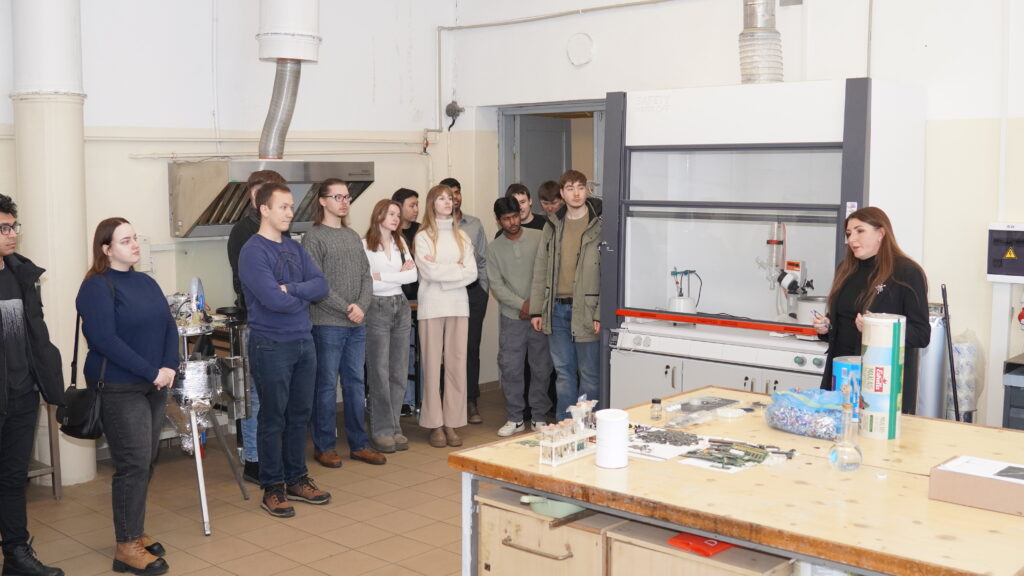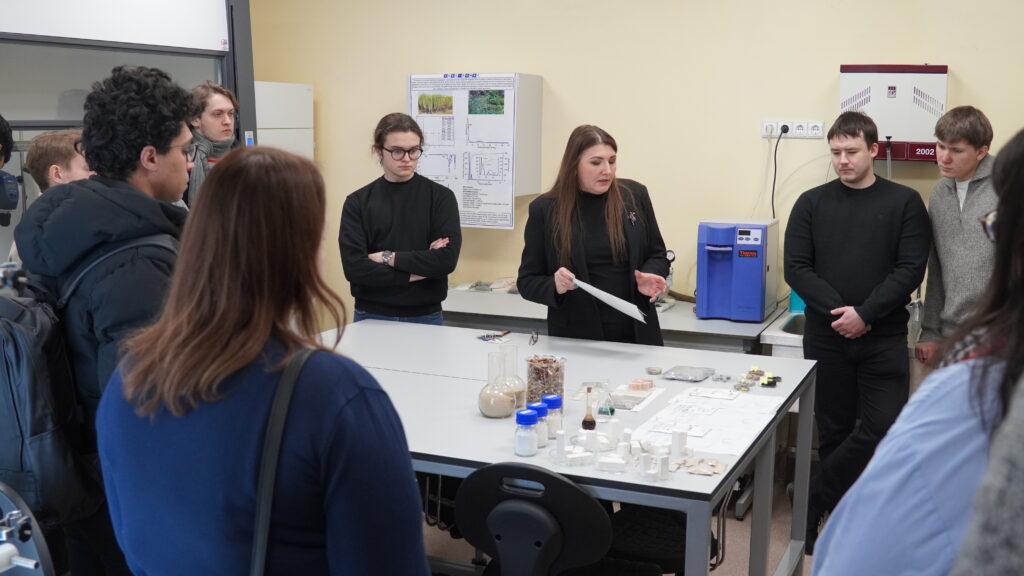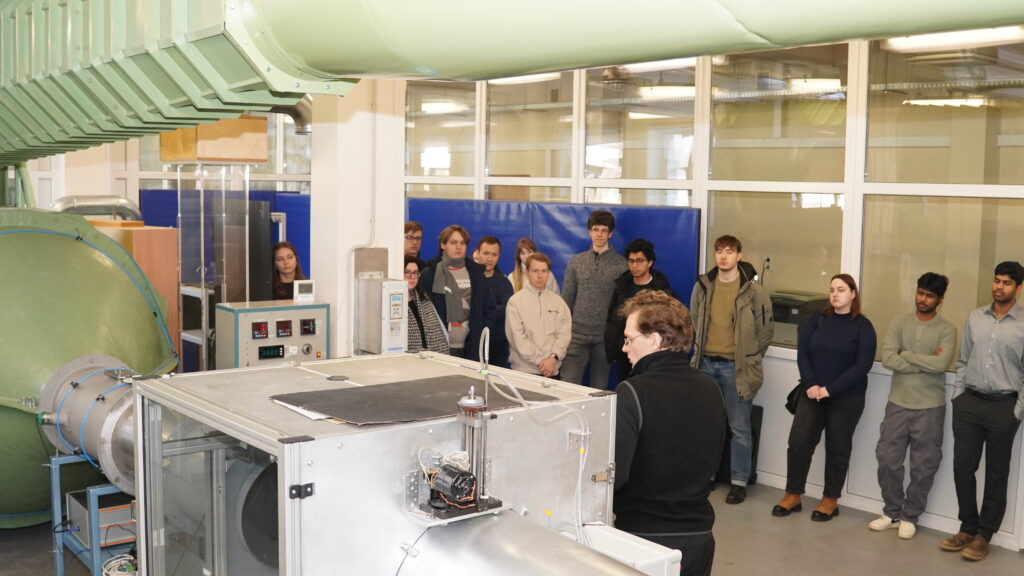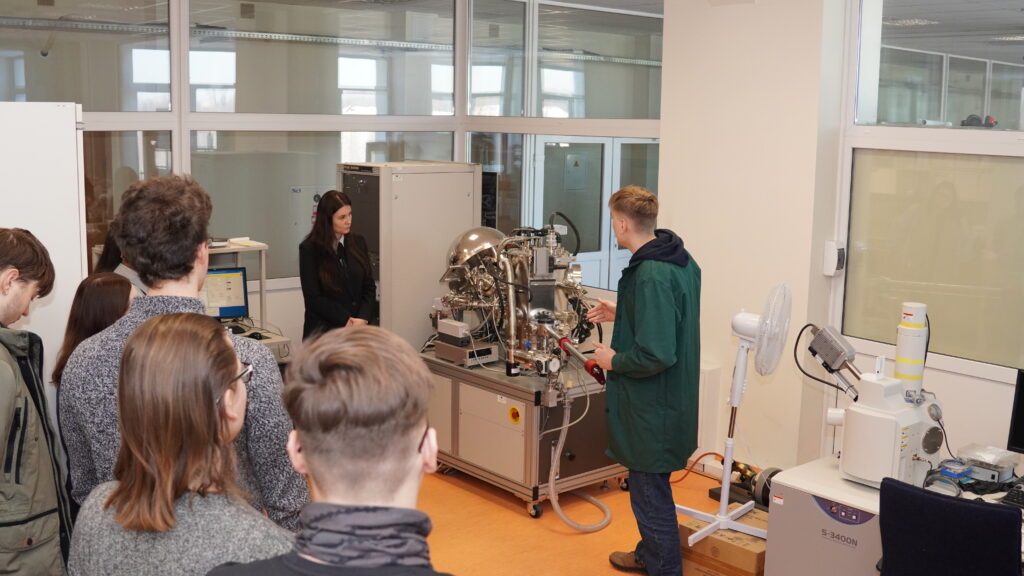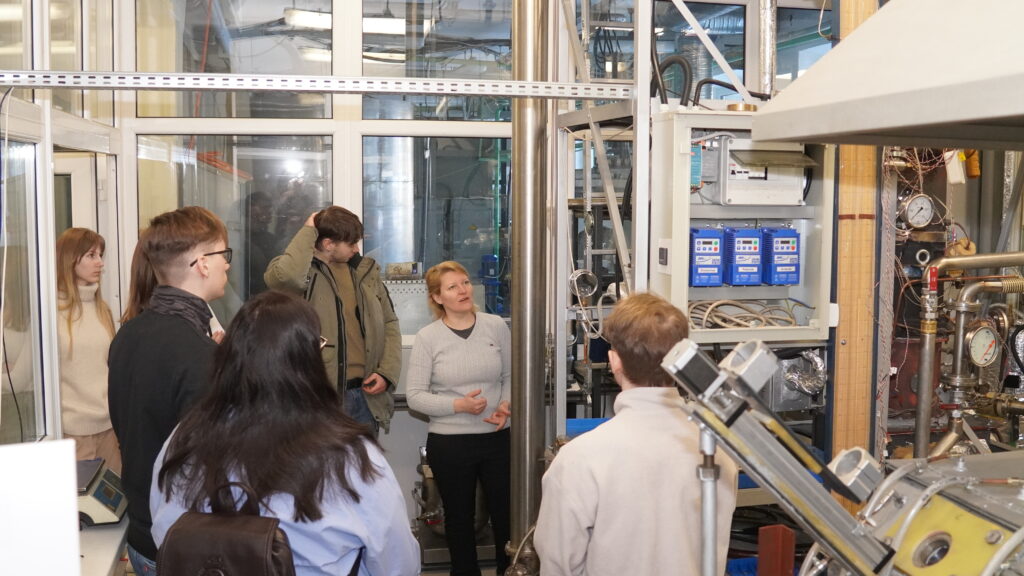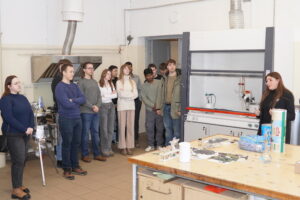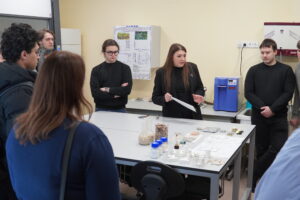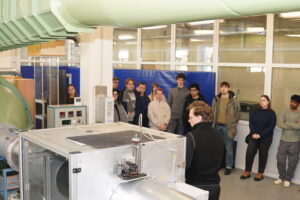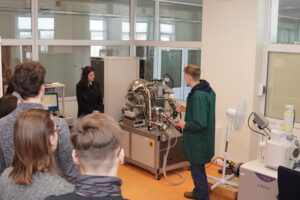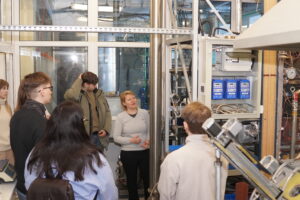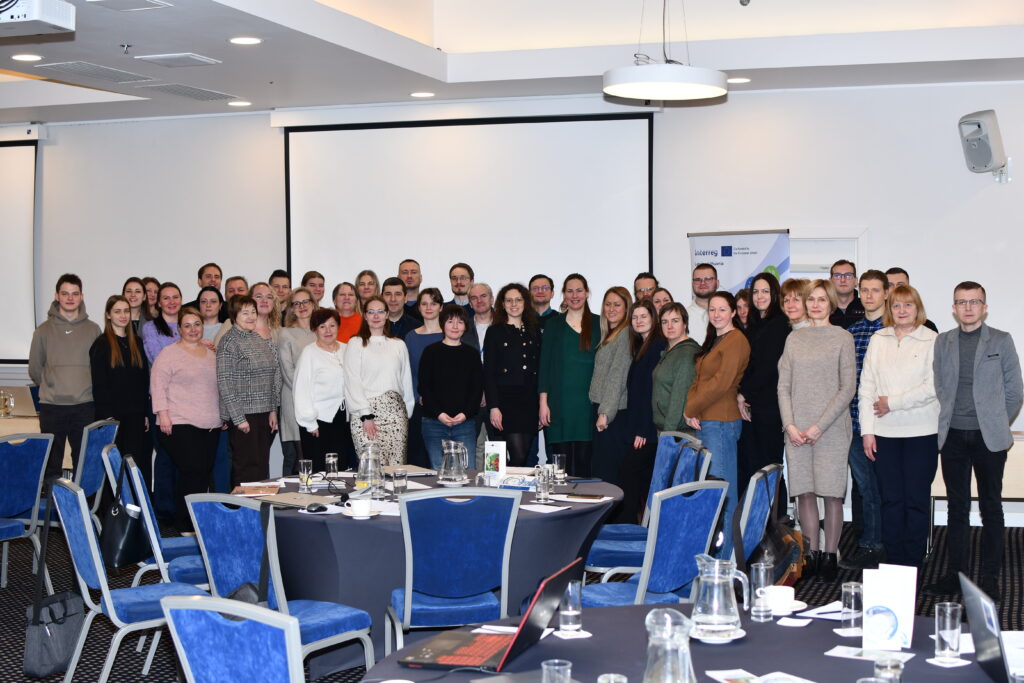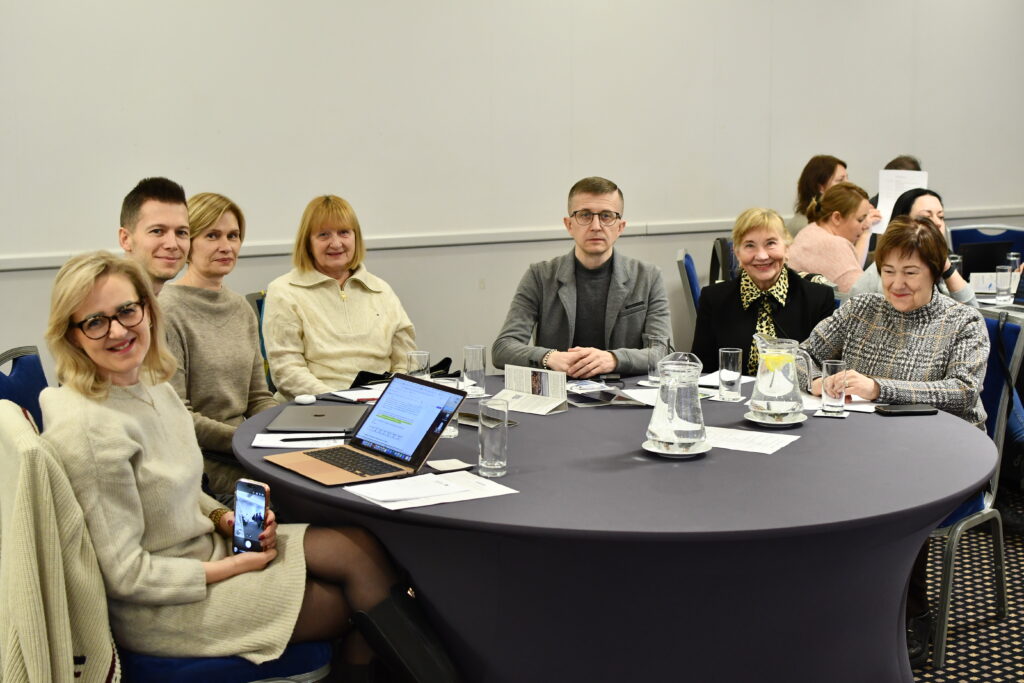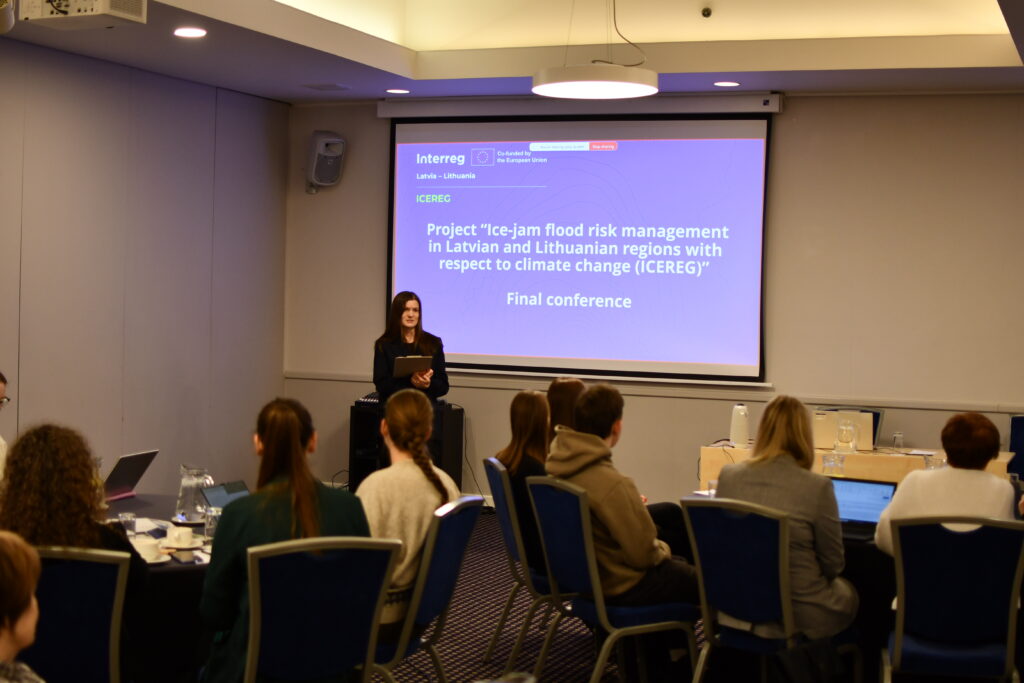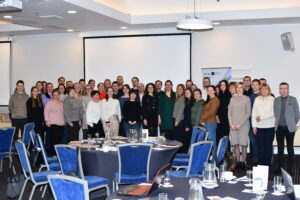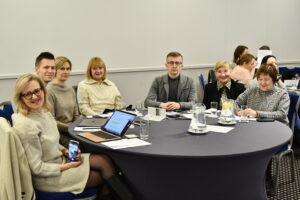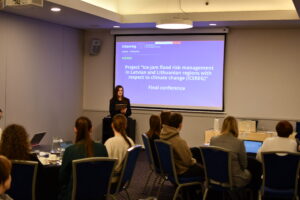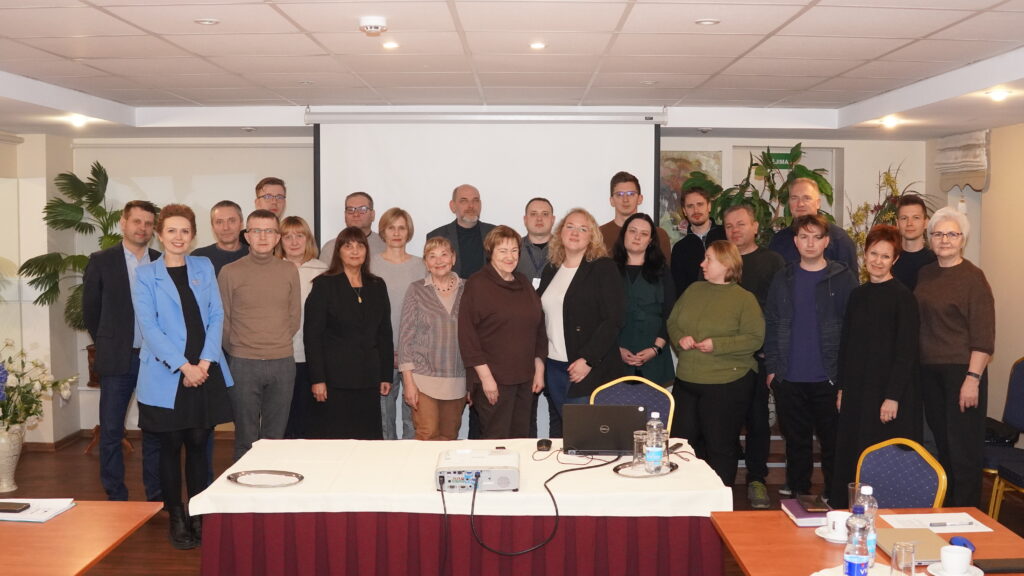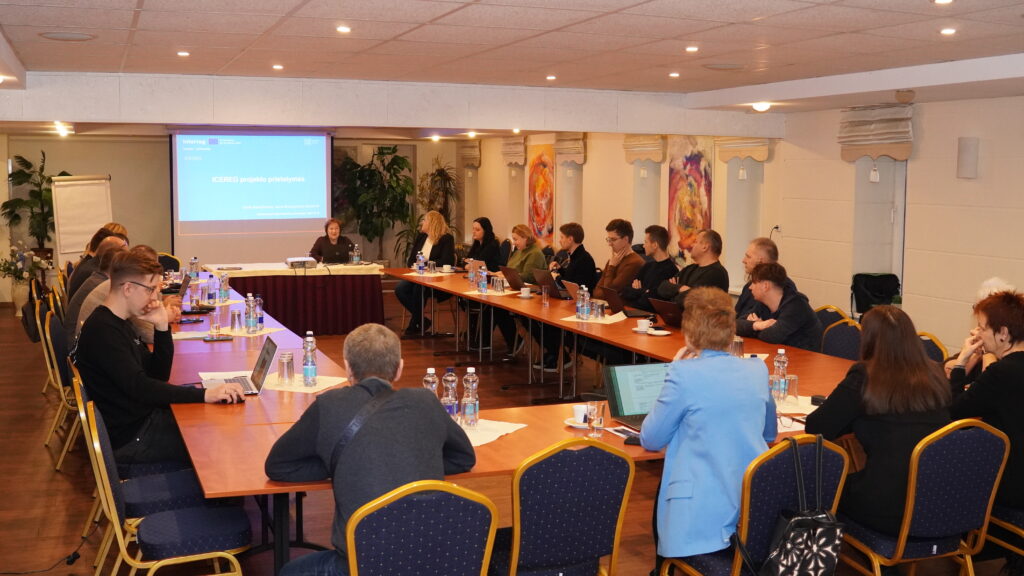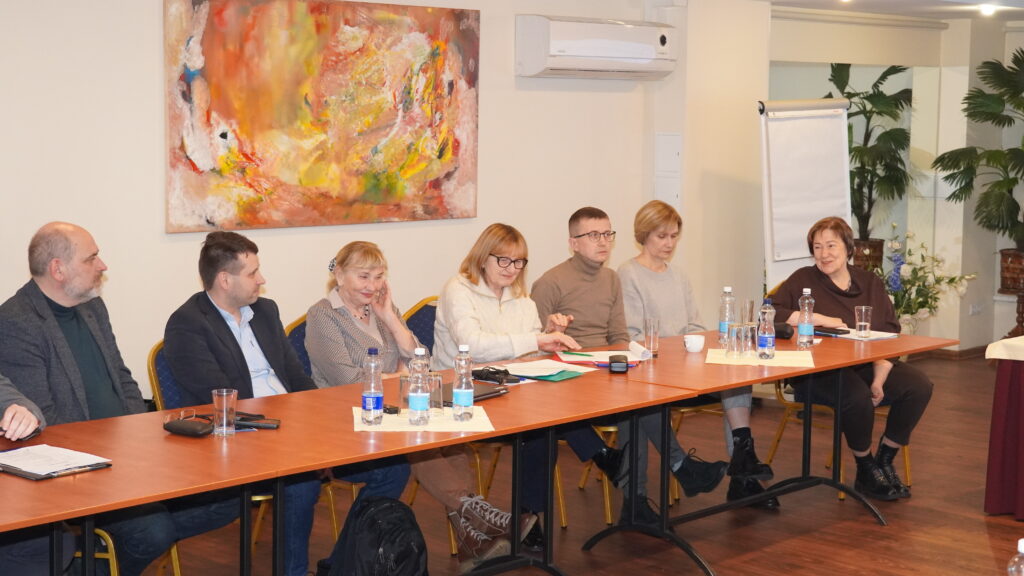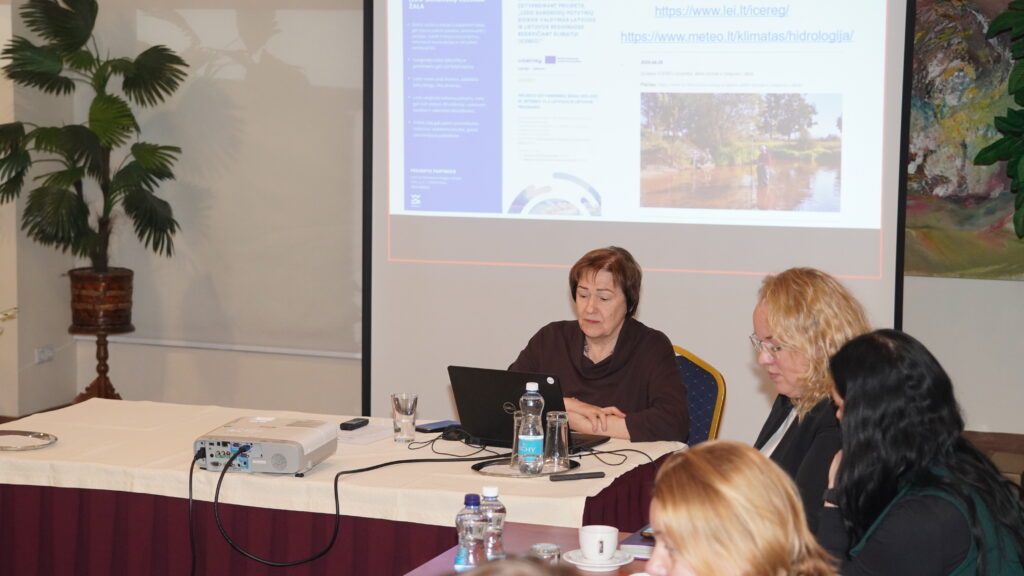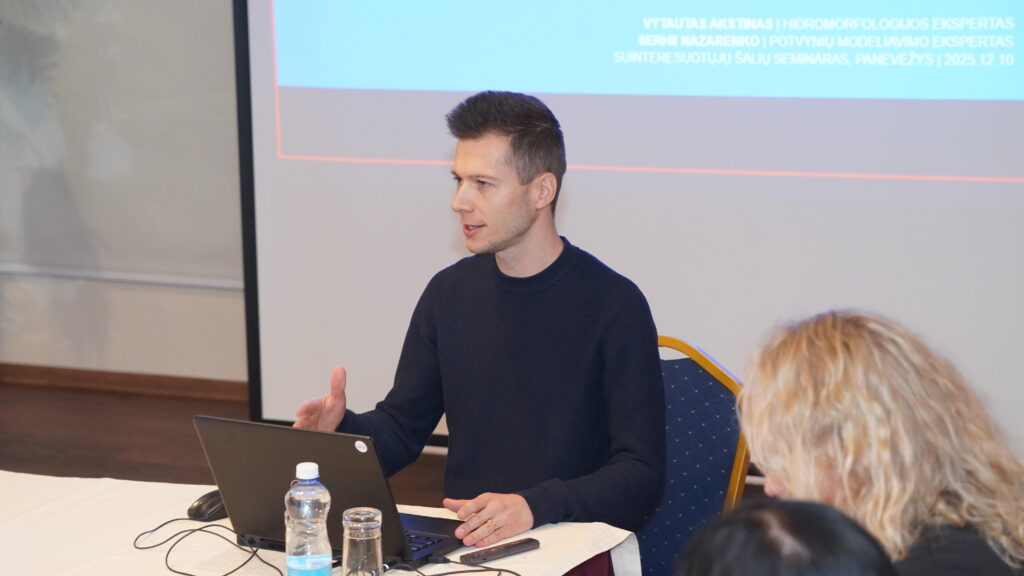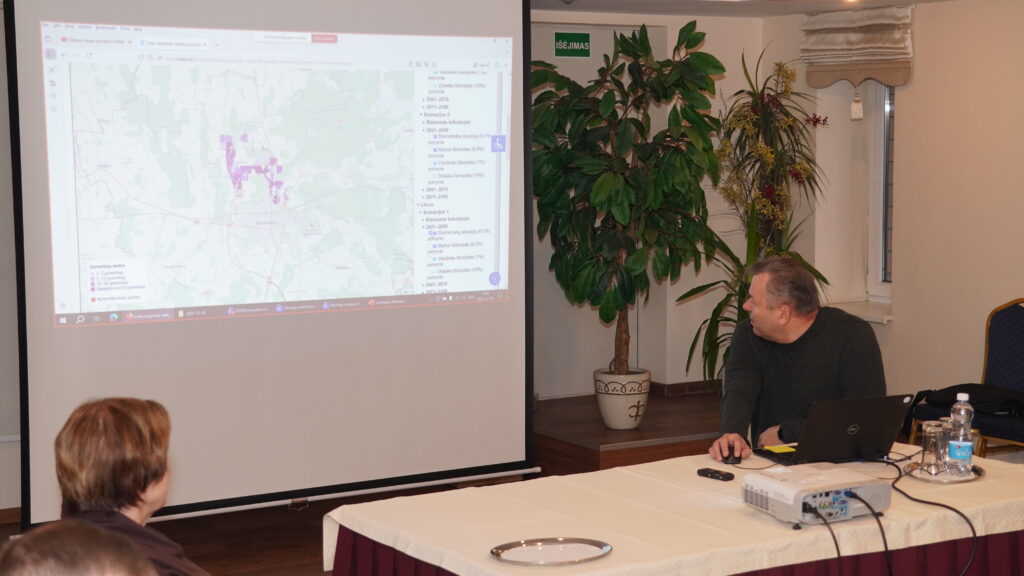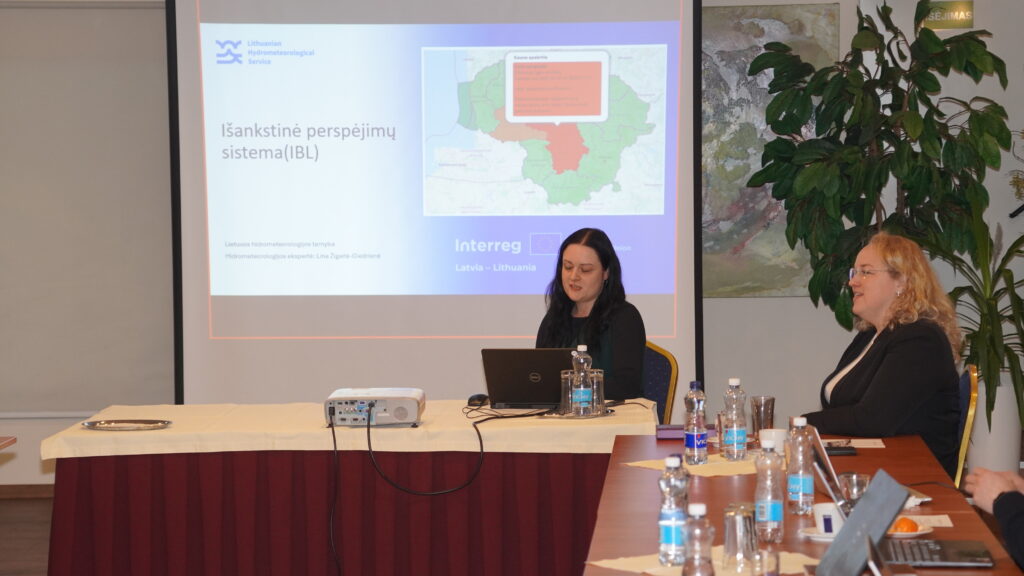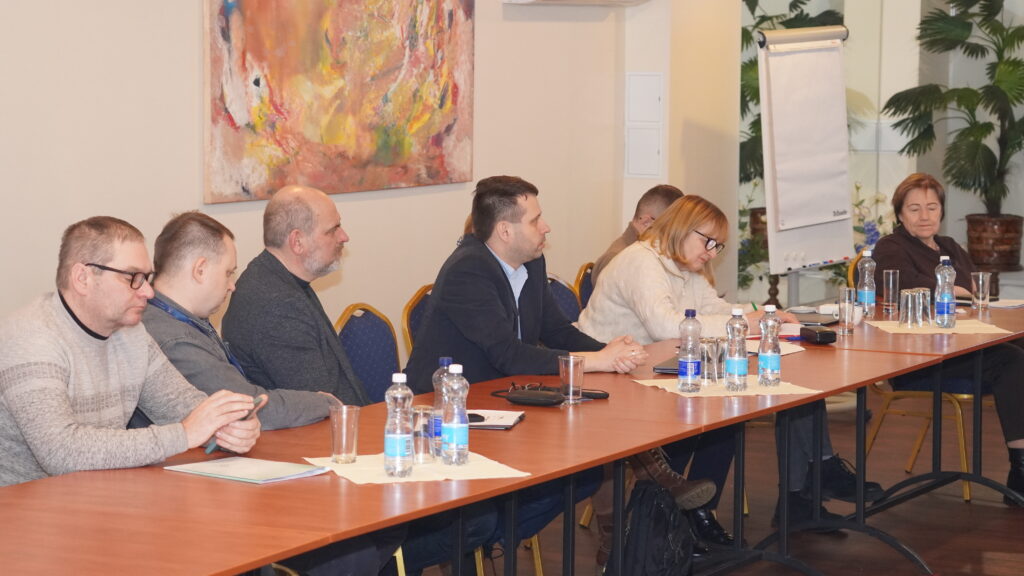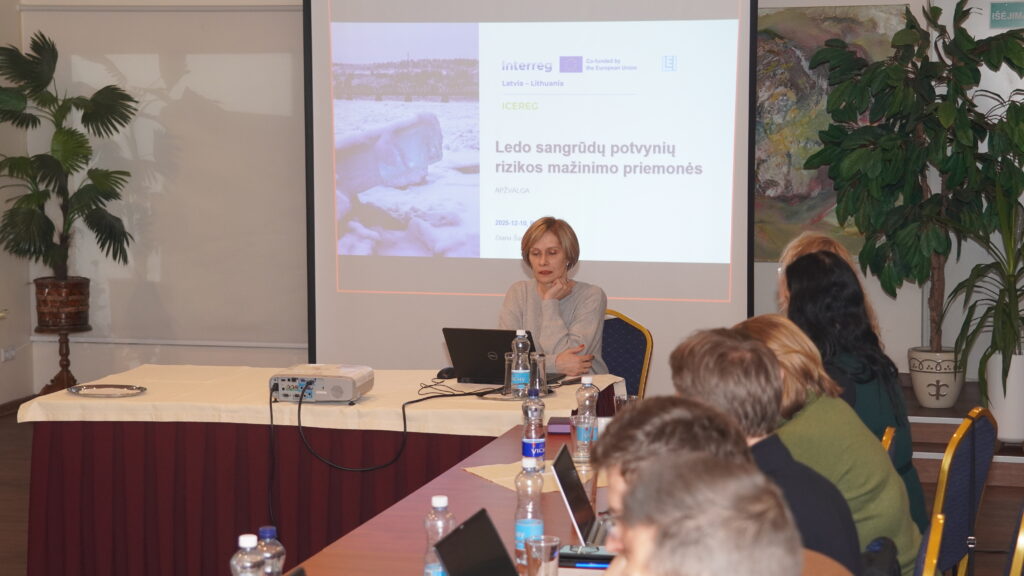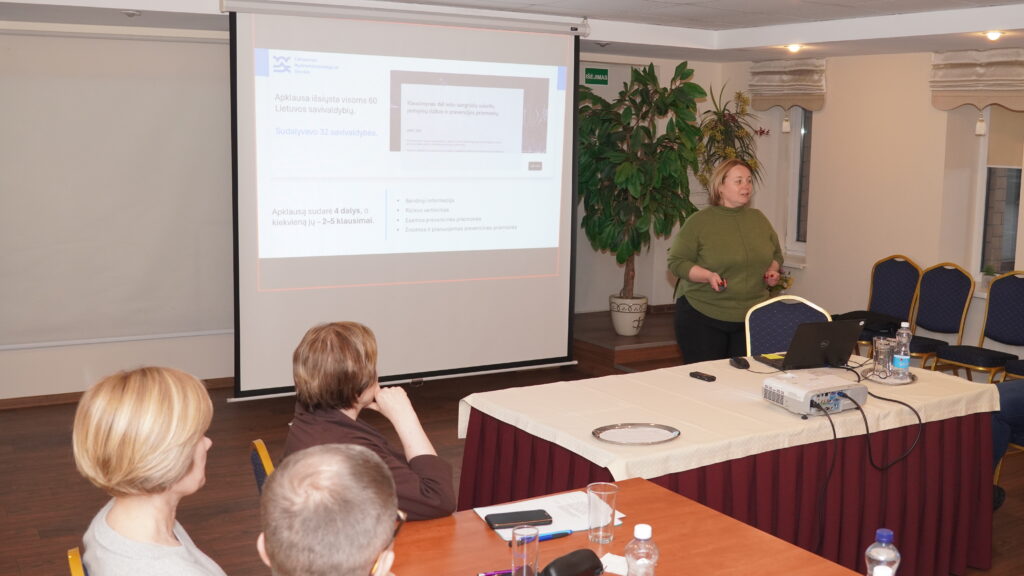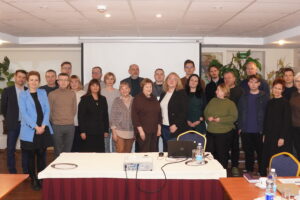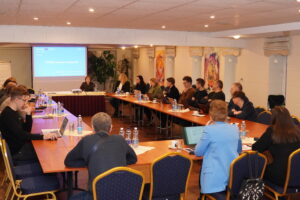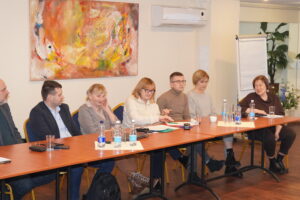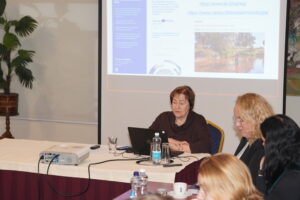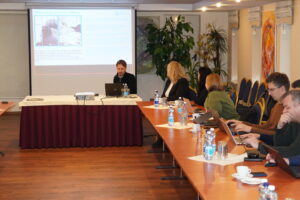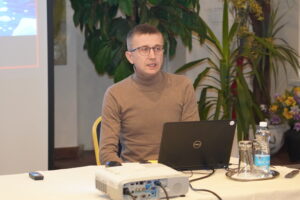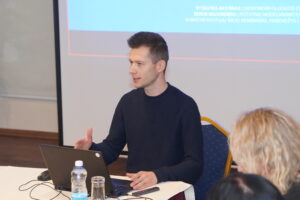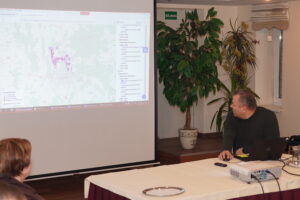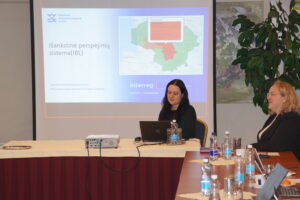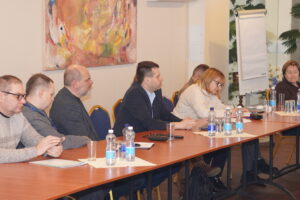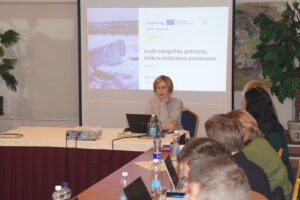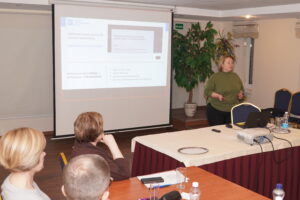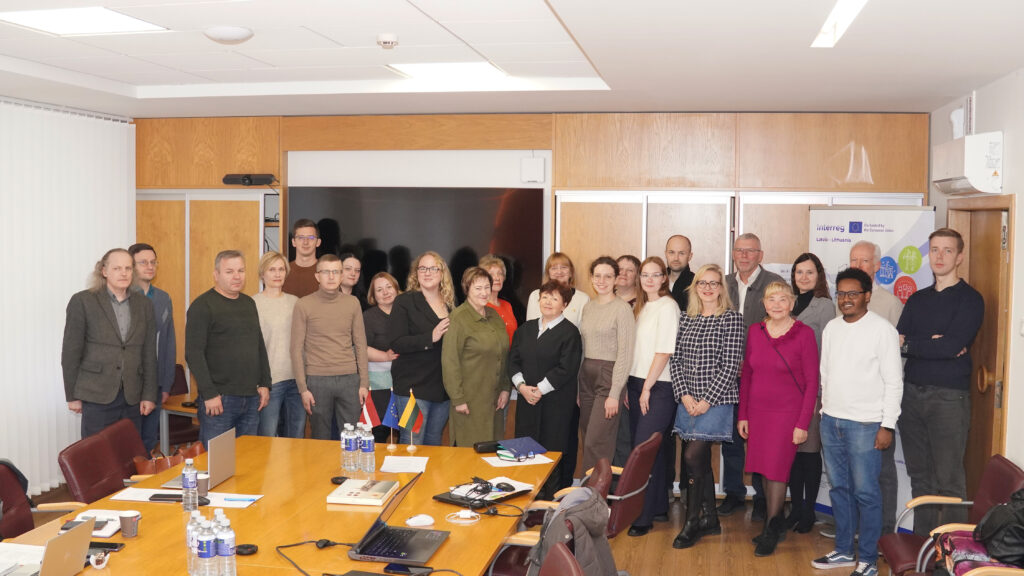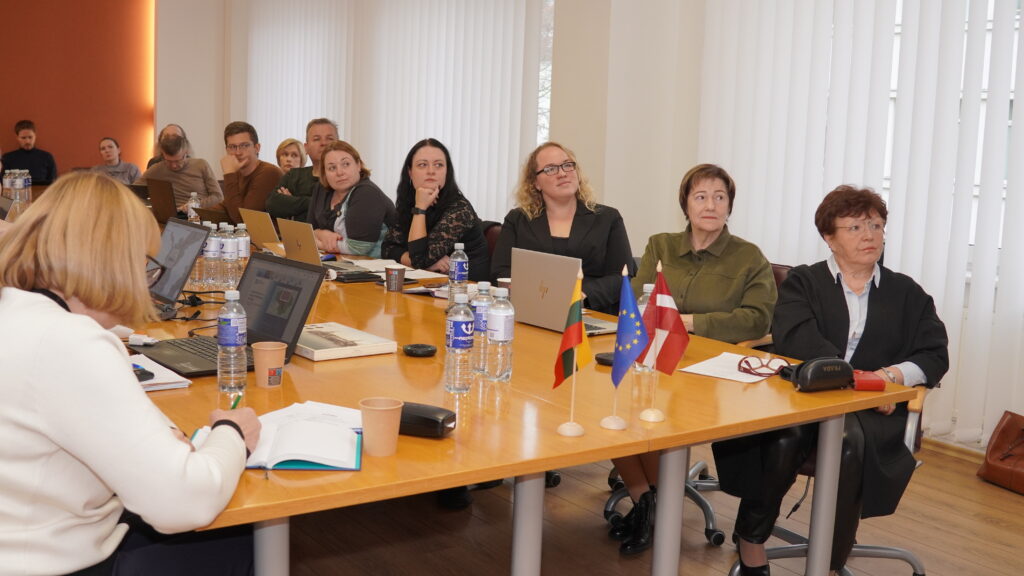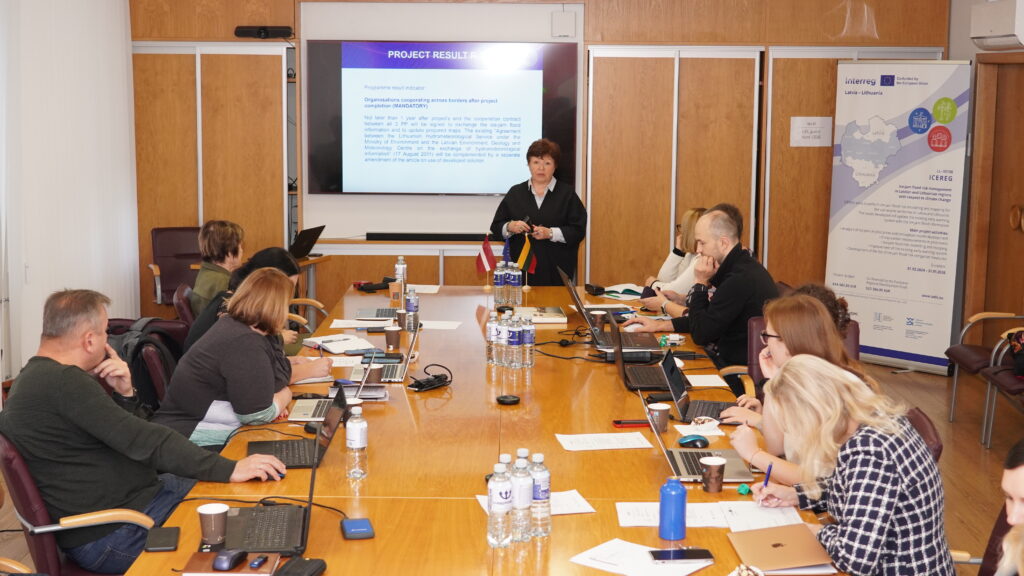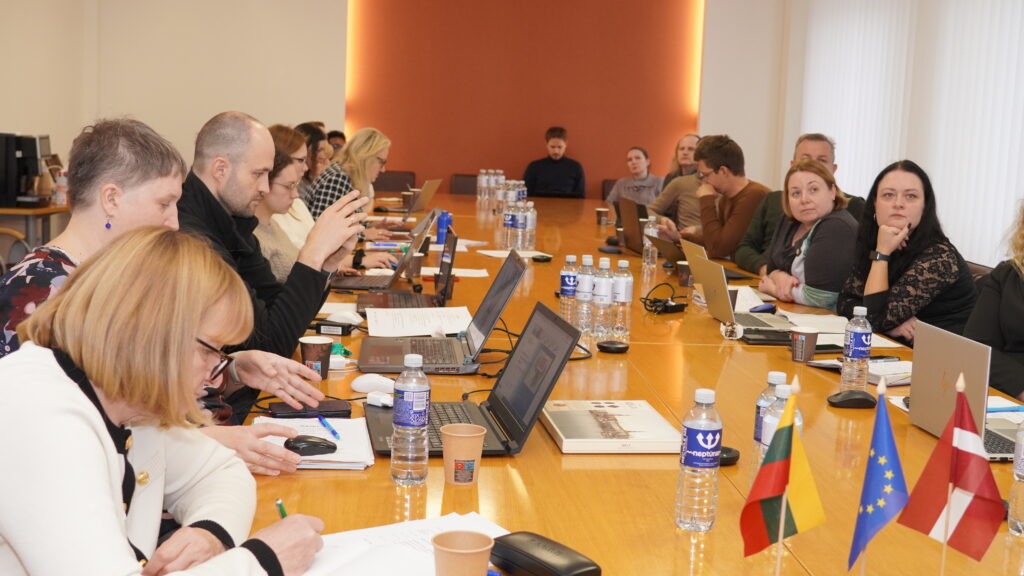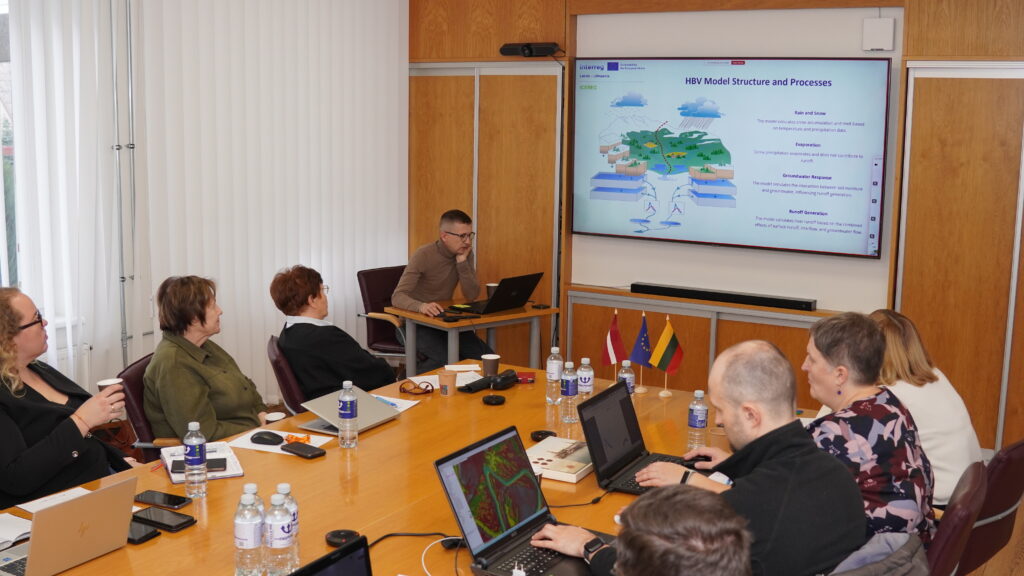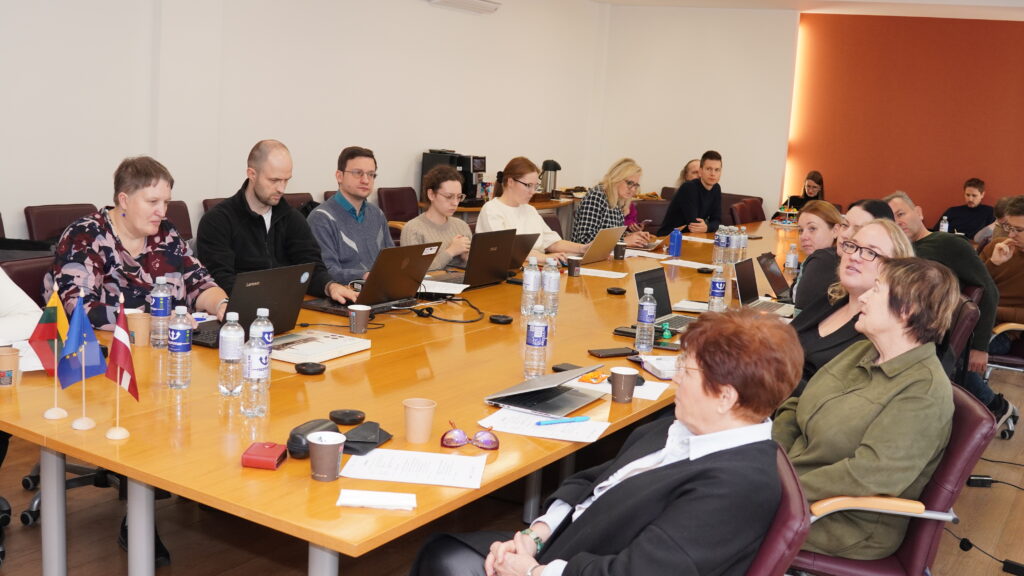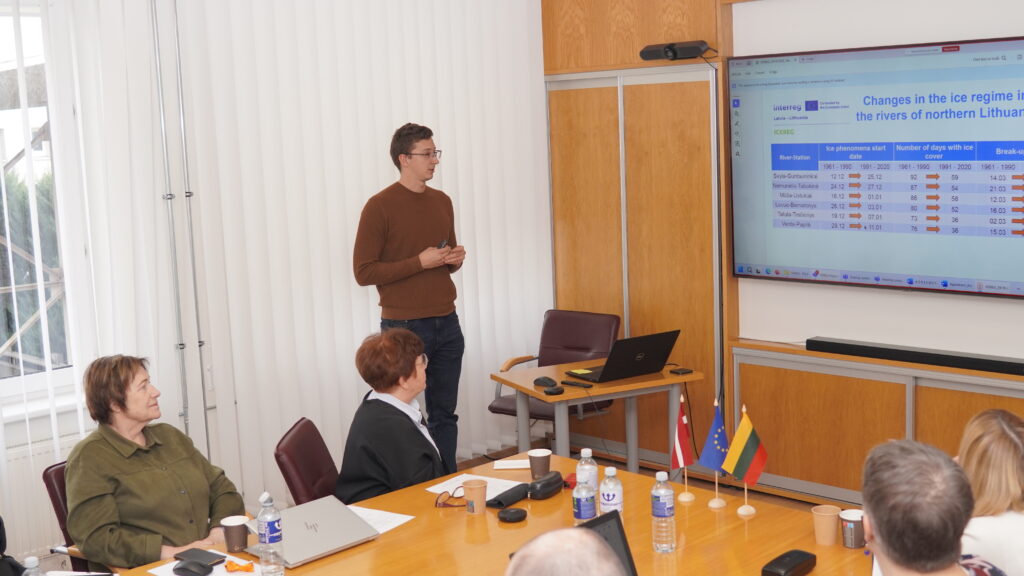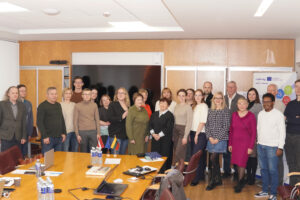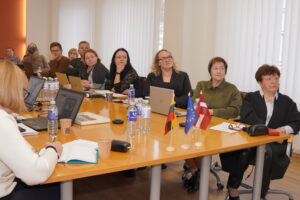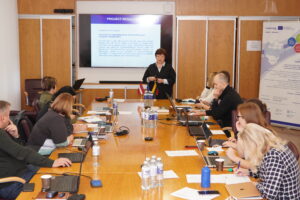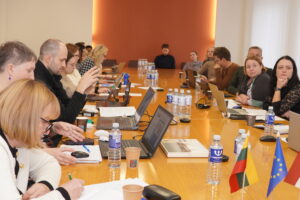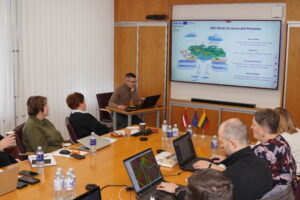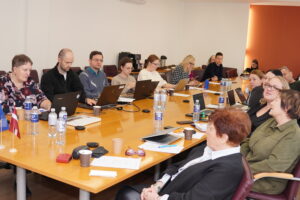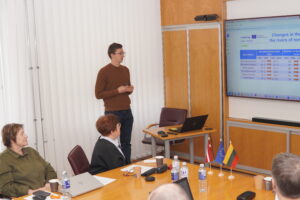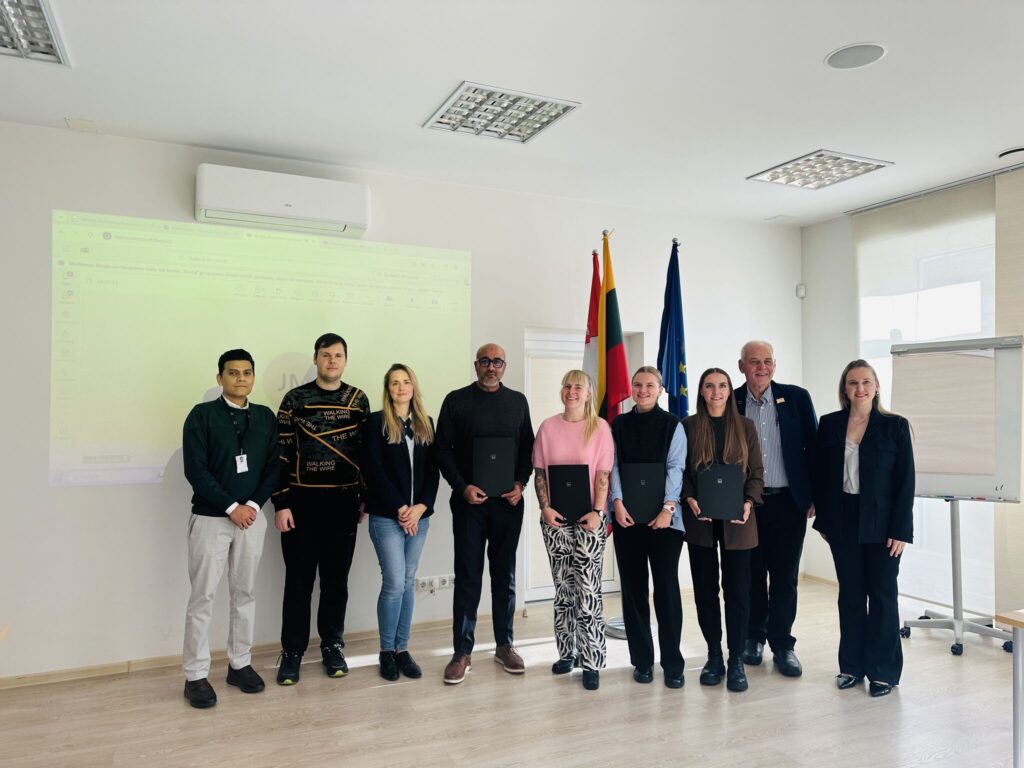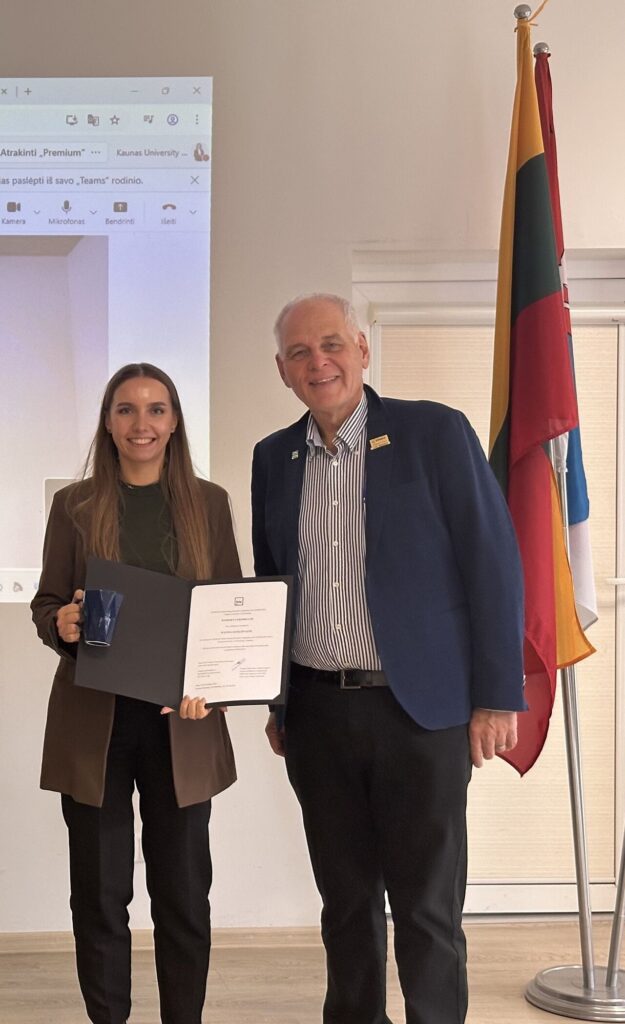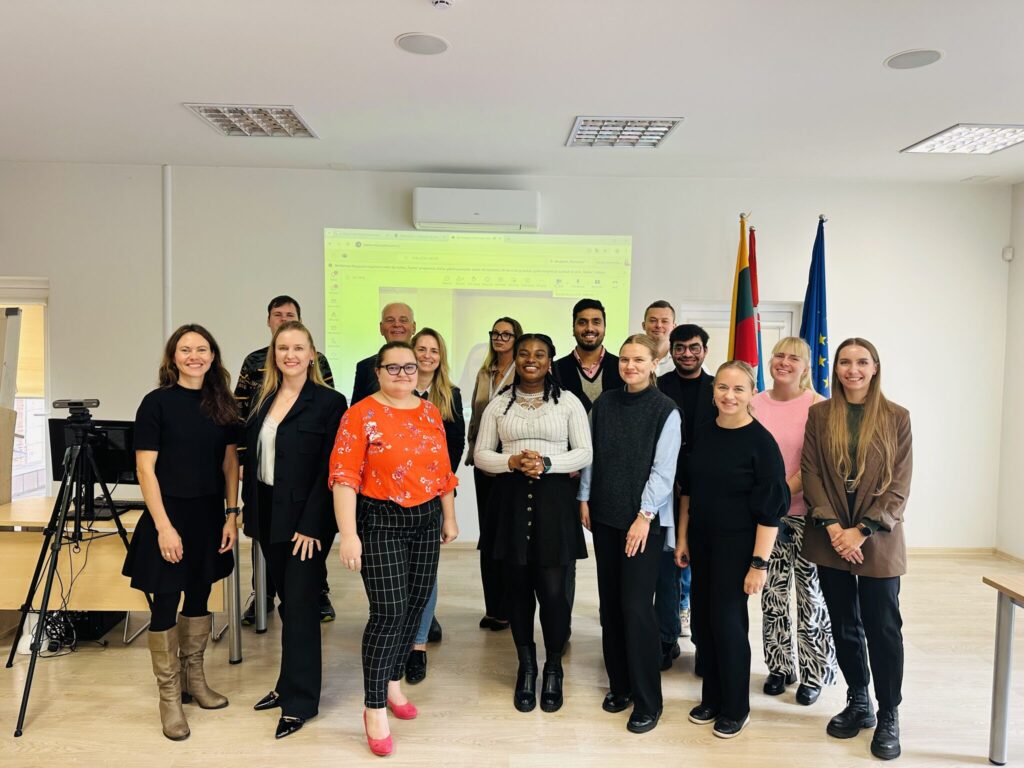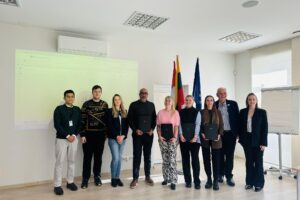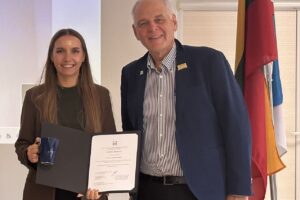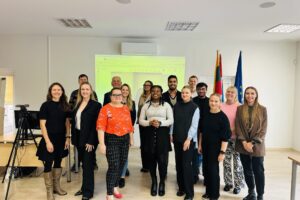A Step into the World of Science: Undergraduate Students Begin Their Internship at LEI
On the first day, the interns were invited to an introductory tour of the Institute, during which they visited six LEI research divisions: the Center for Hydrogen Energy Technologies, Combustion Processes, Materials Research and Testing, Plasma Processing, Heat-Equipment Research and Testing, and Nuclear Engineering laboratories. They were introduced to the Institute’s infrastructure as well as the diverse and interdisciplinary activities and achievements of these divisions.
The tour helped the interns become more familiar with the laboratory where they will carry out their internship, as well as with other research divisions, giving them a deeper understanding of LEI’s work and the variety of ongoing scientific research.
For more information about doing an internship at LEI, visit: https://www.lei.lt/praktika/
The ICEREG Project Final Conference Took Place
On 21 January 2026, the ICEREG project final conference “Ice-jam flood risk management in Latvian and Lithuanian regions with respect to climate change” was held in Riga at the Radisson Blu Daugava Hotel. Experts from Latvia and Lithuania presented the key project results, including ice-jam flood risk modelling and mapping, climate change impact projections, improvements to early warning systems, and proposed flood risk mitigation measures. The conference highlighted the importance of cross-border cooperation and learning from historical flood events to strengthen public safety and resilience in the future.
The Project is funded by the European Union’s Interreg VI-A Latvia–Lithuania Programme 2021–2027
The Lithuanian Energy Institute announces a call for applications for a Project Leader position
The Lithuanian Energy Institute announces a call for applications for a Project Leader position
The Lithuanian Energy Institute (LEI) announces an open international call for applications for an early-career researcher (Project Principal Investigator) seeking to establish their first independent research team and to implement a high-level research and experimental development (R&D) project under the Progress Measure No. 12-003-03-06-01 “My First Research Team”.
This measure provides opportunities for an early-career researcher to begin an independent stage of their scientific career, strengthen scientific leadership, form a thematic research group, and contribute to the development of energy efficiency, sustainability, and innovation.
The Project Leader position under the “My First Research Team” programme is open to a researcher at the beginning of their scientific career who is prepared to lead an independent research team within the Lithuanian Smart Specialisation thematic area related to R&D and innovation (R&D&I)priority “New Production Processes, Materials and Technologies” including the following thematic areas:
a) Advanced materials and structures;
b) Energy efficiency and smart solutions.
Applications are accepted for the following topic:
“Investigation of the Synergy between Hydrophobic Nanostructured Coatings and the Leidenfrost Effect for Friction Reduction.”
As the need to reduce emissions and energy consumption in the maritime sector increases—particularly with the transition to innovative fuels such as hydrogen—new solutions for reducing friction-related losses are required. The Leidenfrost effect, in which a stable vapour layer forms on a surface, can significantly reduce friction between water and a ship’s hull. Therefore, it is necessary to investigate the synergistic effect of hydrophobic nanostructured coatings and surface texturing, enabling the initiation, stabilisation, and maintenance of a vapour film under realistic ship operating conditions.
The main research objective is to develop and experimentally validate a technological concept for reducing hydrodynamic drag through surface modification, experimental investigation of the Leidenfrost effect, assessment of friction and energy losses, and analysis of heat and mass transfer.
The research should focus on the application of two-phase flows, the Leidenfrost effect, and surface engineering to reduce hydrodynamic resistance in maritime transport, including:
- the use of hydrophobic and nanostructured coatings;
- studies of vapour film formation and stability;
- combination of active and passive drag-reduction methods;
- investigation of heat and mass transfer processes under non-standard conditions;
- applications in the context of maritime energy efficiency and emission reduction.
The research results will contribute to a fundamental understanding of the impact of two-phase flows on the reduction of hydrodynamic drag and energy efficiency, thereby providing a foundation for future technological innovations in maritime transport
Applicant’s compliance with the call requirements
a) Qualification Requirements
Candidates who are eligible to apply are those who:
- have obtained a PhD degree within the last 7 years prior to the application deadline (periods of maternity, paternity, parental leave, or long-term illness are not included);
- not have previously served as a project leader of Lithuanian Research Council-funded projects specified in the ineligibility criteria of this call;
- demonstrate scientific output and competencies indicating the potential to independently lead a research team;
- be prepared to implement an original, relevant, and feasible research project aligned with LEI’s scientific fields and infrastructure.
The candidate must:
- possess competencies to carry out, organise, and coordinate R&D activities;
- be able to conduct scientific research independently and collaboratively within research teams;
- critically analyse and synthesise complex scientific ideas;
- have experience in preparing and/or participating in national and/or international R&D, innovation, and science dissemination projects;
- be capable of publishing research results in national and/or international scientific journals and presenting them at scientific events;
- understand the potential application of research results in cultural, social, and economic contexts;
- have proven scientific experience in heat and mass transfer processes and materials engineering.
b) Funding Eligibility Restrictions
To ensure support for the target group of the programme “My First Research Team”—early-career researchers—the candidate must not have served as a project leader, by the application deadline, in Lithuanian Research Council-funded projects implemented under the following measures and/or programmes:
- the 2014–2020 EU Structural Funds Investment Action Programme Measure No. 01.2.2-LMT-K-718 “Targeted Research in Smart Specialisation Areas”.
- the 2014–2020 EU Structural Funds Investment Action Programme Measure No. 09.3.3-LMT-K-712 “Development of the Scientific Competence of Scientists, Other Researchers, and Students through Practical Scientific Activities”, excluding measures for promoting students’ scientific activities and for postdoctoral fellowships.
- researcher’s groups projects.
- the State Programme for Lithuanian Studies 2016–2024.
- short-term research in the fields of health, education, and training.
- national research programmes: Welfare Society, Healthy Ageing, Sustainability of Agro-, Forest and Water Ecosystems, Towards Future Technologies, Modernity in Lithuania.
- competitive priority research programmes: Welfare Society, Strengthening Societal Resilience and Crisis Management in the Context of Contemporary Geopolitical Events.
- the dedicated programme “Information Technologies for the Development of Science and the Knowledge Society”.
- projects carried out under bilateral and multilateral international agreements: Lithuania–Taiwan projects, the Baltic Research Programme, Lithuania–Poland projects.
- projects carried out under measure No. 12-001-01-02-01 “Strengthening Innovation Ecosystems in Research Centers” Annex 13 to the description of the project being implemented (applies to the scientific direction of applied competence centers, thematic leaders, research team leaders, and their proposed teams that will carry out R&D projects in accordance with the internal procedures of the relevant partner institution).
c) Main Responsibilities of the Project Principal Investigator
The Project Principal Investigator will:
- organise and coordinate project team activities and project implementation;
- conduct the planned research and experimental development activities;
- analyse, summarise, and document research results;
- prepare and publish scientific publications and present results at conferences;
- ensure dissemination of project results and international cooperation;
- prepare interim and final project reports.
d) Requirements for team composition and target indicators
- The MPK project team must include at least one student (Bachelor’s–Doctoral level), at least one postdoctoral researcher, and at least three researchers from abroad. One or more scientists employed as research staff may also be hired. The MPK research team may not include scientists who are employed by the Partner or another institution in senior or principal researcher positions and/or who hold administrative positions (this restriction does not apply to the MPK Project Leader).
- When planning the MPK research project, the Project Leader must aim to achieve the following monitoring indicators:
- Implemented research and experimental development projects – 1;
- Number of publications produced under the funded project – 2;
- Number of researchers from abroad attracted to LEI – 3 researchers;
- MPK project researchers undertaking professional development abroad – 4 researchers
Funding and Working Conditions
- Funding: up to EUR 350 000 for direct project costs and 7% for indirect costs;
- Project duration: up to 36 months;
- Project start date: no later than 1 September 2026;
- Employment contract: full-time (40 hours per week) for the Project Principal Investigator;
- Hourly rate: up to EUR 36.36/hour (gross);
- Workplace: Lithuanian Energy Institute, Breslaujos g. 3, Kaunas, Lithuania.
Benefits and Opportunities
By choosing the Lithuanian Energy Institute, you will receive:
- meaningful scientific work at one of the strongest energy research institutes in the Baltic region, conducting nationally and internationally significant research in energy, sustainability, and innovation;
- an opportunity to start an independent scientific career, establish and lead your first independent research group, and strengthen your scientific leadership as a project leader;
- access to modern laboratory and experimental infrastructure for advanced research in two-phase flows, surface engineering, heat and mass transfer, and energy technologies;
- international collaboration opportunities, including long-term partnerships with EU universities and research centres, and participation in international projects and networks (Horizon Europe, COST, EERA, etc.);
- active support for early-career researcher development, including leadership training, international visibility, and opportunities to prepare future international proposals;
- a supportive institutional environment fostering scientific initiative, innovation, open collaboration, and dissemination of research results.
The mandatory application document package must include:
- Description of the MPK research project and additional annexes related to the project description (e.g. Gantt chart, schematics, etc.).
- contribution to knowledge creation (key research, methods, publication impact);
- contribution to the scientific community (mentoring, peer review, open data);
- societal/economic impact (applied results, cooperation with industry);
- future plans (research development, especially in the context of the programme);
- list of scientific publications (journal articles—especially indexed in Clarivate Analytics Web of Science, international monographs or chapters);
- description of other scientific activities (conference presentations, memberships in national and/or international organisations, participation in scientific committees, expert activities);
- results of project activities (applications to national and/or international R&D and innovation projects; funding received; patents granted or patent applications filed);
- participation in doctoral training (supervision of PhD candidates, postdoctoral researchers, interns, involvement in doctoral studies);
- copy of the PhD diploma or certificate;
- description of the R&D project’s alignment with the Smart Specialisation priority and thematic focus (up to 3 000 characters);
- documents substantiating the extension of the eligibility period, if applicable (copies of documents confirming maternity / paternity / parental leave or long-term incapacity for work, if the PhD degree was awarded more than 7 years before the application deadline; copies of documents confirming long-term illness, if applicable).
Applications must be submitted via the online form no later than 15:00:00 (CET) on 13 February 2026. Applications submitted after the specified deadline will not be considered.
You can find the description of the selection procedure for the project leader of the “My First Research Team” programme here.
NOTE: The Lithuanian Energy Institute will process personal data submitted for the purpose of this project leader selection in accordance with data protection regulations.
Applicants may withdraw their consent to participate in the selection process at any time and request deletion of their personal data by contacting Rimantas.Levinskas@lei.lt.
Contact Information
For information about the call, consultations, or application submission, please contact:
Rimantas Levinskas
Lithuanian Energy Institute
Tel. +370 374 01 804
Email: Rimantas.Levinskas@lei.lt
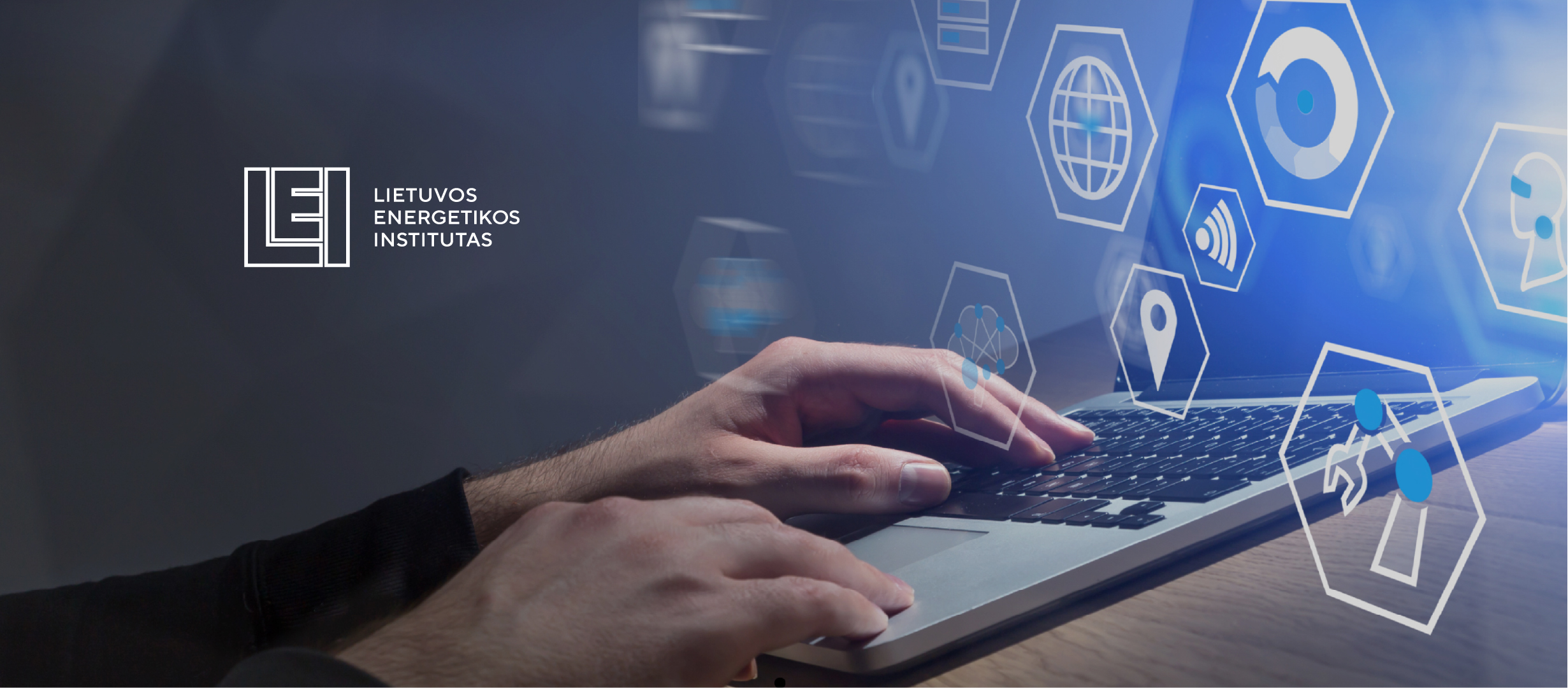
Climate and Health: LEI Scientists Investigate the Impact of Extreme Weather on Mortality in Lithuania
In November 2025, LEI launched the project “Linking Cardiovascular Mortality and Suicide Risks with Extreme Weather Events in Lithuania under Climate Change (CliMed-LT)”. The aim of the project is to investigate how extreme weather events affect human health and mortality risk in Lithuania and to help better prepare for the challenges posed by climate change.
Alarming Statistics
Mortality from stroke, acute myocardial infarction, and suicides remains one of the most serious public health problems in Lithuania and worldwide. Stroke is the second leading cause of death globally and one of the main causes of death in Lithuania. The number of deaths from stroke in the country is twice the European Union average. Acute myocardial infarction accounts for 38% of female deaths and 44% of male deaths from cardiovascular diseases.
Lithuania has also long been among the top ten countries in the world with the highest suicide rates. These figures indicate serious challenges to public health that require deeper understanding and new solutions.
Extreme Weather and Health Risks
Epidemiological studies conducted in the United States, China, Japan, South Korea, and European countries show that extreme climatic (weather) events can have a significant impact on human health. Heatwaves and cold spells, air pressure fluctuations, precipitation, humidity, and sunlight exposure have been linked to higher risks of stroke, acute myocardial infarction, and suicides.
However, in the Lithuanian context, these links are still poorly understood and insufficiently studied. There is a lack of detailed research that would allow an assessment of how our country’s specific climatic conditions affect public health.
Developing Advanced Forecasting Models
The CliMed-LT project, conducted in collaboration with the Lithuanian University of Health Sciences (LSMU), aims to identify links between extreme weather events and their impact on public health in Lithuania. Special attention will be paid to suicide rates and mortality from non-communicable diseases – stroke and acute myocardial infarction.
To achieve this goal, data from different fields will be combined – high-resolution meteorological datasets and death registry information. Statistical methods will be used to develop advanced forecasting models that can identify the most important risk factors, quantitatively assess their impact, and model possible future scenarios in the context of climate change.
From Research to Practical Solutions
The project focuses not only on theoretical research but also on practical benefits. It aims to create early warning systems and evidence-based recommendations to help strengthen the national healthcare system’s preparedness and resilience to extreme weather events.
By combining environmental and health data, the CliMed-LT project will contribute to a deeper understanding of the interactions between climate change and public health and help build a more resilient and better-prepared healthcare system in Lithuania.
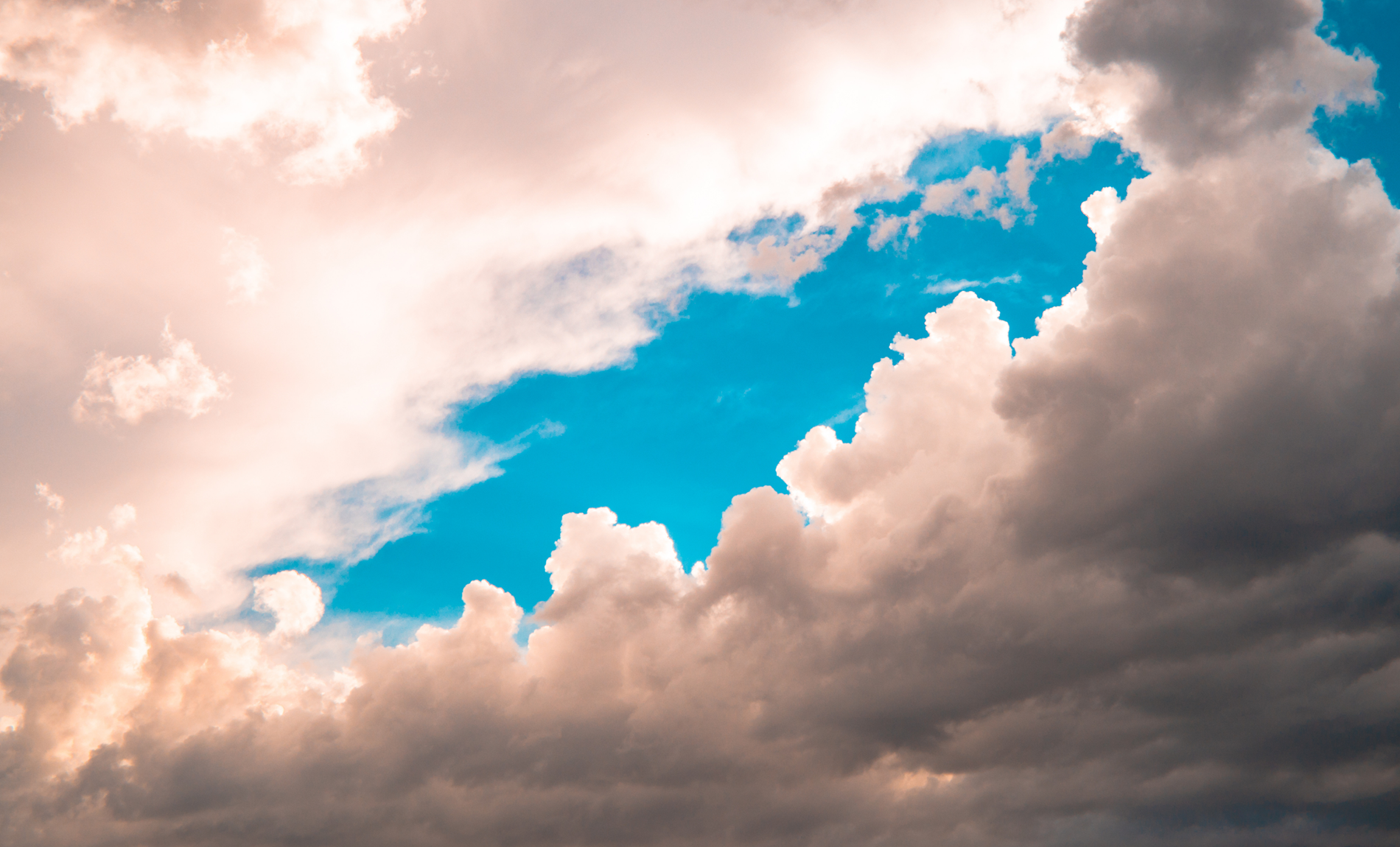
Happy Holidays!
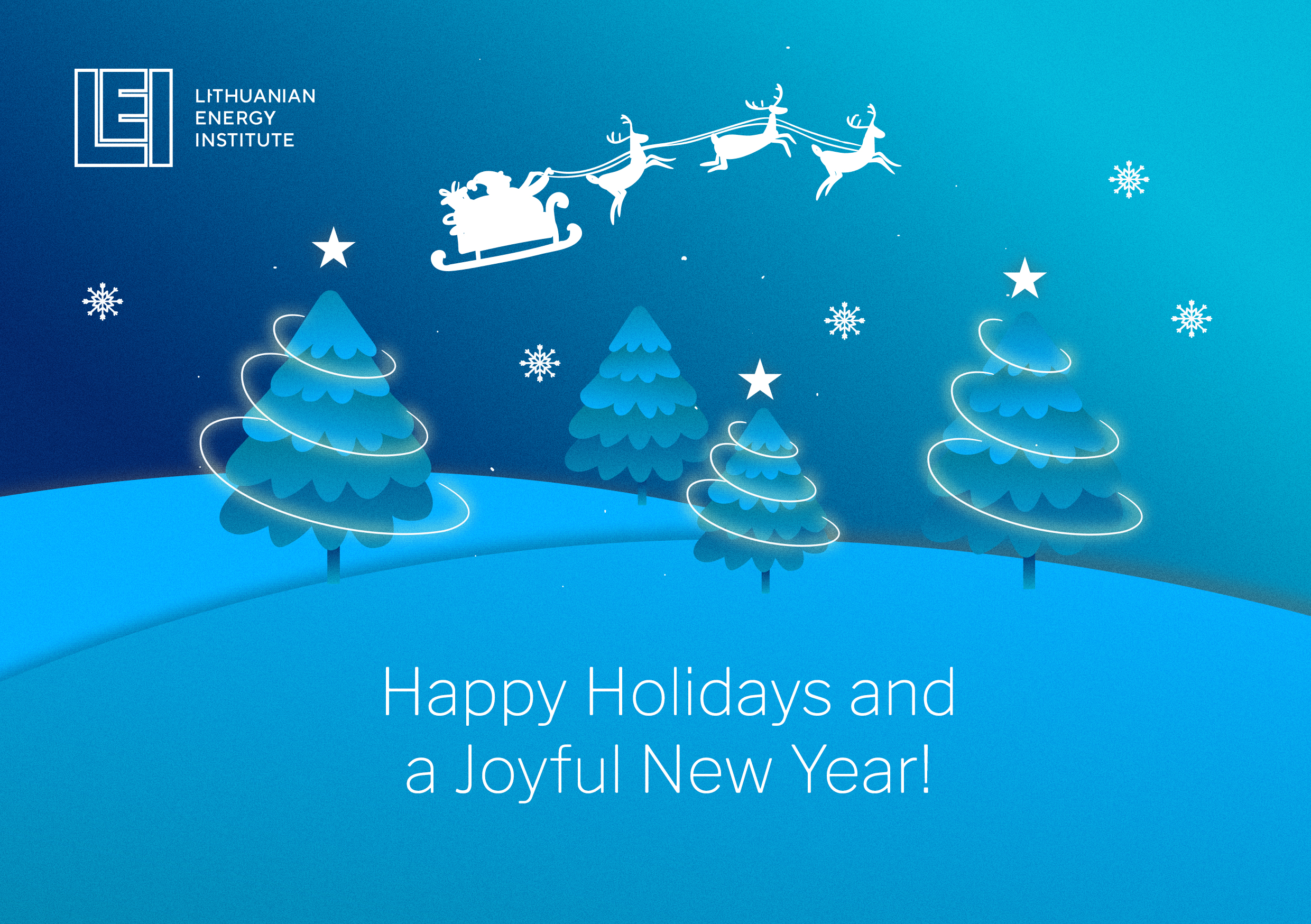
Congratulations to Deimantė Čepauskienė on completing her PhD
Congratulations to Deimantė Čepauskienė, Junior Research Associate at the LEI Laboratory of Heat-Equipment Research and Testing, who successfully defended her PhD dissertation on 19 December 2025 on the topic of The influence of mineral additives on ash melting behaviour and slag formation in agro-biofuels (Technological Sciences, Energetics and Power Engineering, T006).
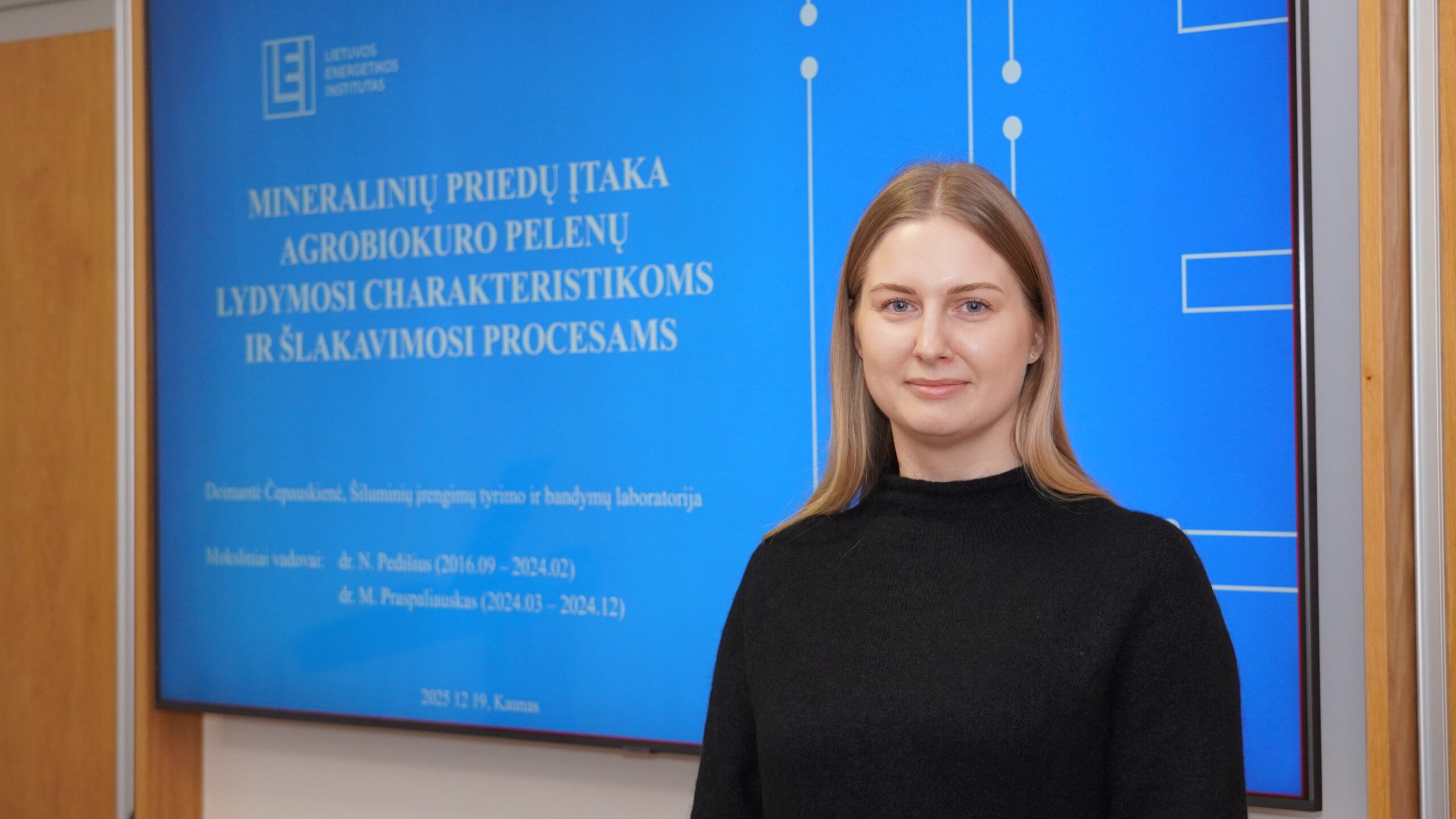
The ICEREG Project Stakeholder Seminar Took Place
On 10 December 2025, a stakeholder seminar of the project “Ice-jam flood risk management in Latvian and Lithuanian regions with respect to climate change” (ICEREG, LL-00136) was held in Panevėžys.
During the seminar, historical flood events, the impact of climate change on river runoff, pilot river flood hazard maps, the flood warning system in Lithuania, and risk reduction measures were presented. Participants also engaged in discussions with project experts from the Lithuanian Energy Institute and the Lithuanian Hydrometeorological Service, shared insights, and explored opportunities for cooperation.
LEI Contest for Students and Young Researches 2025
The 2025 competition for the most advanced master’s students, doctoral students, and young researchers at the Lithuanian Energy Institute is announced.
Competition categories:
The most advanced for 2025
- Bachelor’s student.
- Master’s student,
- First-year doctoral student,
- Second-year doctoral student,
- Third-year doctoral student,
- Fourth-year doctoral student,
- Young researcher.
Participants in the competition:
Bachelor’s student – a person employed at LEI and studying in a bachelor’s program.
Master’s students – individuals employed at LEI and studying in a master’s program, or individuals employed at LEI who have not graduated from their master’s program more than two years ago.
Doctoral students – individuals studying in a doctoral program at LEI. Doctoral candidates who were on academic leave or had their studies temporarily interrupted during the reporting period are not eligible to participate in the competition.
Young researchers – individuals employed in primary positions at LEI who have graduated with a doctoral degree no more than 5 years ago (this period does not include parental leave).
Deadline to submit applications: November 27, 2025, 4:00 p.m. via email at study@lei.lt, in .docx format, named “Application_Surname_Name”. The application received from the Applicant’s e-mail is considered appropriately submitted.
Competition regulations and application form:
The competition evaluates participants’ scientific activities performed from September 1, 2024, to August 31, 2025.
Awards will be given to the competition winners in the form of a financial incentive.
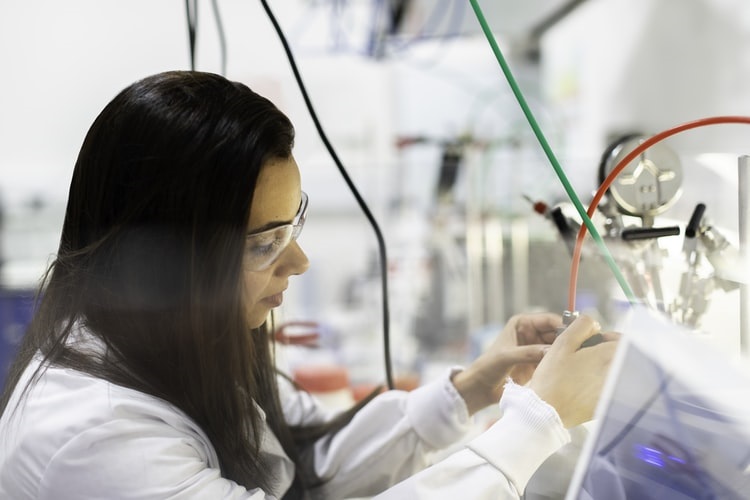
ICEREG Project Experts’ Meeting Held in Kaunas
On October 29, the Lithuanian Energy Institute (LEI) organized the experts’ meeting of the project “Ice-jam flood risk management in Latvian and Lithuanian regions with respect to climate change” (ICEREG, LL-00136).
During the meeting, project partners discussed the main results achieved and presented the draft guidelines for early warning of ice-jam floods, risk mitigation measures, and hazard and risk maps for the pilot areas. Discussions were also held on the agenda of the upcoming meetings with stakeholders from Lithuania and Latvia and on the presentations for the Final Conference.
The meeting was attended by experts from the Latvian Environment, Geology and Meteorology Centre (LEGMC), the Lithuanian Hydrometeorological Service (LHMT), and the Lithuanian Energy Institute (LEI).
KTU hosts the national round of the Global Pitching Research Competition
For the second consecutive year, Lithuanian researchers joined the InSPiR2eS Global Pitching Research Competition (IGPRC). This international initiative empowers early-career academics to communicate their research ideas with clarity and purpose.
What began as a small event at Kaunas University of Technology (KTU) has grown into a national platform for collaboration and inspiration. This year, the competition gathered young researchers and doctoral students from six Lithuanian institutions and a wide variety of fields – from physics and chemistry to economics, marketing and psychology.
The Lithuanian round of IGPRC 2025 built on last year’s success, evolving from a university-hosted seminar into a national event with a shared goal: to improve how researchers tell the story of their science. Participants were challenged to present their work using the Pitching Research Framework – a simple but powerful structure designed by Professor Robert Faff to help academics express the “what, why and how” of their research in just a few minutes. The atmosphere at KTU’s School of Economics and Business was both competitive and collaborative, with participants learning not only to pitch their ideas but also to listen, connect, and build bridges across disciplines.
At its heart, IGPRC reflects a shift that many universities are now embracing – research communication as a core academic skill. By focusing on storytelling, clarity, and purpose, the competition helps young scholars move beyond jargon and complexity, allowing their ideas to resonate with both academic and wider audiences.
Four winners to represent Lithuania on the global stage
After a day of inspiring presentations, the jury announced four national winners who will represent Lithuania in the IGPRC 2025 Global Semifinals: Gabrielė Bumbulytė Žukevičienė (Nature Research Centre), Justina Jaseliūnaitė (Lithuanian Energy Institute), Syed Muntazir Mehdi (KTU School of Economics and Business), and Roberta Spangelytė (Lithuanian Research Centre for Agriculture and Forestry). These talented researchers stood out not only for their scientific excellence but also for their ability to communicate complex ideas with passion and precision.
Each winner brought a unique perspective to the competition. Gabrielė Bumbulytė Žukevičienė presented research on how food and beverage industry by-products can be transformed into high-value protein and biofertilizers, offering a sustainable model for the circular bioeconomy. Justina Jaseliūnaitė impressed the judges with her study of microchannel vortices and their role in improving cooling systems – a technical topic explained in a way that anyone could follow. Syed Muntazir Mehdi examined the delicate balance between efficiency and cognitive agency in AI-driven customer interactions, reflecting on how technology influences human decision-making. Meanwhile, Roberta Spangelytė focused on enzyme-assisted extraction and fermentation of underutilised plants to improve women’s nutrition, showing how science can directly impact health and wellbeing.
All four winners will compete with peers from around the world for a share of the AUD 20,000 prize pool. But beyond the financial reward, most participants see the experience itself as the real prize – an opportunity to gain confidence, receive constructive feedback, and see their work through a global lens.
From framework to movement: the InSPiR2eS network
Behind the competition stands Professor Robert Faff, a renowned academic and founder of the InSPiR2eS network. His Pitching Research Framework has become a global tool for academics who want to refine how they communicate their ideas. The framework encourages researchers to focus on the essence of their work – identifying the problem, explaining the approach, and highlighting why it matters.
“Lithuania’s engagement in the IGPRC this year has been truly inspiring,” said Professor Faff. “The national event reflected a wonderful blend of research diversity, intellectual curiosity, and communicative clarity – exactly what the Pitching Research Framework aims to cultivate. The quality of the pitches was exceptional, with participants showing impressive mastery not only of their research ideas but also of how to tell their research story with confidence and purpose.”
Faff’s collaboration with Lithuanian institutions, particularly with KTU, has played a significant role in building local capacity for effective research communication. Through workshops, mentorship, and international networking, he has helped doctoral students and early-career researchers gain a new appreciation for the human side of science – its stories, questions, and societal impact. The growing involvement of Lithuanian universities signals that this approach is taking root, gradually transforming the way researchers prepare, present, and promote their ideas.
A culture of clarity and connection
The Lithuanian round of IGPRC was organised by Assoc. Prof. Neringa Gerulaitienė from KTU’s School of Economics and Business, who also serves as Lithuania’s country node leader for the InSPiR2eS network. For her, the competition is more than just an event – it is part of a broader effort to nurture a culture of open and confident research communication in Lithuania.
“I am truly delighted that we succeeded in bringing this global competition to Lithuania,” she said. “The growing interest and participation from different institutions show that the Pitching Research Framework is becoming an important tool for developing research communication skills. It is inspiring to see how Lithuanian researchers are learning to present their ideas with clarity and confidence and connect with the global research community through InSPiR2eS.”
The jury, which included Professor Faff alongside Dr Rūta Ubarevičienė, Ernestas Uzdila, Dr Ieva Barauskienė, Dr Farrukh Naseem Qureshi, Dr Meda Andrijauskienė and Dr Eglė Butkevičiūtė, praised the participants’ enthusiasm and diversity. “It’s wonderful to see young researchers engaging in high-quality science communication and sharing their work across fields and institutions,” said Dr Ubarevičienė, Chair of the Young Academy of the Lithuanian Academy of Sciences. “Such initiatives fill an important gap in Lithuania’s research culture, and I hope this becomes a lasting tradition.”
Assoc. Prof. Gerulaitienė echoed this sentiment: “We are incredibly proud of all participants and the progress we see in developing research communication skills across Lithuania. I do not doubt that our finalists will represent Lithuania with excellence on the global stage and continue to inspire other young researchers to share their ideas with confidence.”
Source: https://en.ktu.edu/news/ktu-hosts-the-national-round-of-the-global-pitching-research-competition/






